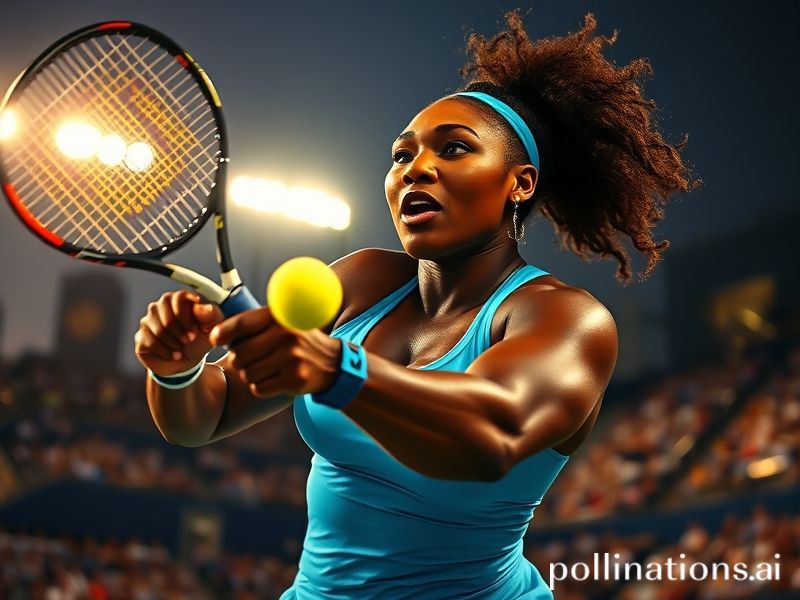Farewell to a One-Woman Superpower: Serena Williams Bids Adieu While the Planet Rearranges Its Emotional Furniture
PARIS — Let us now praise famous backhands. Serena Williams, the only American export more durable than Boeing jets and twice as likely to leave smoking craters in her wake, has ostensibly exited the arena. The official line is “evolving away from tennis,” a euphemism so Silicon-Valley it practically comes with stock options and a mindfulness coach. In reality, Serena has simply reached the stage where the planet has run out of plausible opponents and must now content itself with reruns.
Across five continents, the obituaries for her “career” are being written in languages she can demolish both on court and in post-match pressers. In Lagos, market traders sell knock-off “Serena 23” shirts next to stalls hawking expired malaria pills—both items promising miracles they can’t quite deliver. In Shanghai, streaming platforms crash as 1.4 billion people try to re-watch the 2012 Olympics demolition of Maria Sharapova, a match that doubled as state-sanctioned stress relief. Meanwhile, in London, the BBC solemnly debates whether she is the “greatest athlete of all time,” a designation the British usually reserve for people who can row in drizzle.
The numbers are vulgar in their magnitude: 23 Grand Slams, 319 weeks at No. 1, $94 million in prize money—roughly the GDP of Micronesia if Micronesia could also hit a 128 mph serve. Those digits, however, miss the collateral damage. Consider the global supply chain of shattered rackets: factories in Guangdong have overtime shifts dedicated solely to replacing the equipment Serena turned into modern art. Or the legion of umpires who now flinch whenever a mother gives them side-eye at the grocery store.
Internationally, Serena’s significance lies less in what she won than in what she broke: the polite apartheid that once passed for women’s tennis. She dragged the sport from genteel country-club catwalks into the Thunderdome, all while wearing beads, catsuits, and, in one memorable French Open, an outfit that looked suspiciously like riot gear. The old guard clutched pearls; the new guard bought merch. Overnight, the polite applause of Wimbledon began to sound like a NATO summit—necessary protocol, but everyone was secretly relieved when the fighter jets showed up.
Diplomatically, she became a soft-power weapon the U.S. deployed without Congressional approval. When the State Department needed a distraction from drone strikes, they sent Serena to Lagos or Mumbai to run clinics for wide-eyed kids who would henceforth measure life goals in forehand speed. If soft power had a sound, it was the sonic boom of her serve ricocheting off stadium roofs from Melbourne to Flushing Meadows.
And yet, for all the triumph, the exit feels oddly anticlimactic—like watching a meteor decide to take up gardening. The farewell tour at the 2022 U.S. Open was choreographed with the subtlety of a military parade: celebrity cameos, corporate sponsors dangling like remoras, and a stadium roaring so loud you’d think democracy had been restored. She lost in the third round, waved goodbye, and promptly announced a venture-capital fund, because nothing says “I’m done competing” like entering the only arena more vicious than professional sports.
Now the planet must confront the void. Nike’s quarterly earnings call sounded like group therapy: analysts asking whether a brand can survive on retro Jordan sales and the faint hope Coco Gauff might one day glare at a line judge. In Compton, the courts where a little girl once learned to swing a racket now host chess clubs—an improvement in safety statistics but a downgrade in intimidation factor.
Still, the satellites keep circling. Somewhere above Earth, a Russian GLONASS module beams down footage of Serena’s 1999 U.S. Open win to cosmonauts who use it as evidence that American exceptionalism is at least aerodynamic. Down below, dictators and democrats alike pause their mutual loathing to retweet her latest Instagram post, because even strongmen know better than to argue with someone who can weaponize a tennis ball.
So she “evolves away.” The rest of us remain, stuck on a rock that suddenly feels smaller, slower, and conspicuously less lethal. History will call her the greatest; the rest of us will simply remember the peculiar comfort of living in an era when one woman could make the entire world hold its breath, if only for the 2.5 seconds it took her to obliterate another serve.







